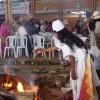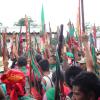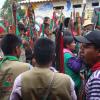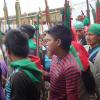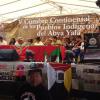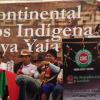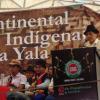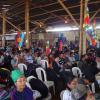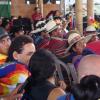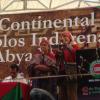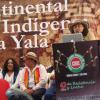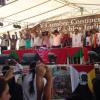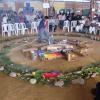Indigenous Peoples
The indigenous peoples of the Andean countries, participants in the
"Andean Forum for Diversity and Pluralism", celebrated in Quito,
Ecuador, from the 16th -18th of November, 2000,
Considering that:
- Indigenous peoples have been victims of racist and discriminatory
practices, procedures and policies throughout history, and we have
equally been subjected to regimes of colonial and neocolonial
domination.
- The demographic and social weight of the indigenous peoples in the
Andean countries is enormously relevant and in countries such as
Bolivia, Ecuador and Peru we truly constitute a majority.
- It has been thanks to the 500 year fight of resistance of indigenous
peoples in the Andean countries that, at least formally, the
multiethnic, multicultural and multilinguistic characters of these
States have been recognized.
- The work among the indigenous organizations has led to the
ratification of Convention No. 169 of the ILO in Colombia, Ecuador,
Peru and Bolivia, with Venezuela now seriously considering its
ratification.
- There exists a profound preoccupation among the indigenous peoples
of the region with respect to the process now in development looking
to the elaboration by the Organization of American States (OAS) of an
American Declaration of the Rights of Indigenous Peoples. There has
not been an appropriate participation of our peoples in this process,
and the rights outlined in the current draft are below the standards
achieved in the United Nations' Draft Declaration on Indigenous
Peoples .
- The indigenous peoples have creatively articulated protest with the
presentation of proposals that tackle themes transcending our specific
demands and aspirations in order to incorporate the struggles of other
peoples and social sectors.
- There exists frustration among indigenous peoples due to the
imbalance caused by the "International Decade of the World's
Indigenous People," which is poorly done and negative, to say the
least.
- There is a preoccupation in our communities due to the process of
reflection and discussion of the United Nation's Draft Declaration on
Indigenous Peoples, which has not advanced in the last few years. On
the contrary, the States would like to incorporate modifications that
limit and seriously endanger our rights, especially those pertaining
to self-determination, restitution and recognition of our lands and
territories, and informed consent.
- Despite important legal and constitutional gains in the respective
Andean countries, our rights have not been put into effect and, in the
majority of cases, exist only on paper.
- The so called "Plan Colombia" is United States military strategy
that, under the pretext of the war against drugs, attempts to
appropriate the biodiversity and natural resources that are found in
our territories and extend war and armed conflict to all countries of
the region.
- We, the indigenous peoples continue to be committed to the
development and long survival of our civil options.
We Resolve:
1. To urge the United Nations to expedite the approval of the Draft
Declaration on Indigenous Peoples, as it has been sanctioned by
various indigenous organizations of the world.
2. To call upon the United Nations to guarantee the appropriate and
ample participation of indigenous delegates in all instances and
international UN organizations: Biological Diversity Convention,
Framework Convention on Climactic Change , World Trade Organization,
World Intellectual Property Organization, UNESCO, World Health
Organization.
3. To request that the United Nations quickly put to work the
"Permanent Forum on Indigenous Issues" in such a way that indigenous
representation responds to the mandate and control of those indigenous
peoples and organizations concerned.
4. To demand that the United Nations establish effective and flexible
modes and mechanisms to punish those States that in any way promote
racist, discriminatory and xenophobic practices.
5. The indigenous peoples of the region are interested in realizing
Conferences and Forums where we can autonomously tackle themes
concerning racism, racial discrimination, xenophobia and intolerance,
for which we hope to have financial and logistical support from the
United Nations.
6. To demand that the member States of the Organization of American
States (OAS) guarantee an appropriate participation of our peoples in
all processes of the elaboration of an inter-American organization
dealing with indigenous rights, and that the rights developed by this
organization not be less than those outlined by the United Nations'
Draft Declaration on Indigenous Peoples.
7. To urge all Latin American and Caribbean States which have not yet
ratified Convention No. 169 of the ILO to do so as quickly as
possible, and that all States which have ratified this treaty
regulate, develop and comply with it, conserving its integrity and
international standards.
8. To demand that the countries of the region appropriately develop
and regulate the rights which they have constitutionally established.
9. To demand that the Countries of the region, in their official
delegations to authorities and international organizations, involve
indigenous peoples selected by representative organizations.
10. We, the indigenous peoples of the Andean region propose the
development of bipartisan meetings with the National Governments with
the goal of discussing, reflecting and taking action against the
negative implications of "Plan Colombia".
11. Indigenous peoples have the obligation and the duty to consolidate
their organizations in order to create continental and worldwide
coordination efforts.
12. To call upon indigenous peoples to continue exercising our sacred
right to self-determination. In this context it is important to
exchange ideas and experiences about autonomous peoples.
13. We, the indigenous peoples of the region, unify ourselves with the
demands, aspirations and vindication of the Afro-American and gypsy
communities. In this context, the fight of vast communities and
peoples is also our fight.
